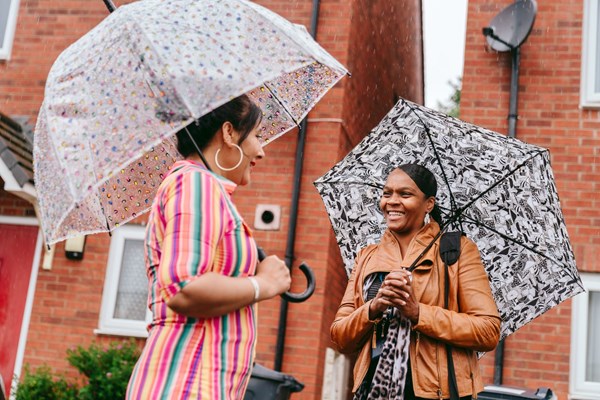
Championing customer service and a coaching approach
- Home
- News
- Latest news
- Championing customer service and a coaching approach
The content in this article may now be out of date. Please try searching for a more recent version.
In my role as engagement specialist, I’m naturally curious. So, I wanted to speak to several colleagues around the business and get to know them a little better – not just for my benefit, but yours too. This is the first in a series of posts where I’ll be sharing these conversations, allowing you to understand more about the work that we do whilst sharing a little insight into the people who deliver these services.
 I recently caught up with associate director of central locality, Natalie Robertson. Natalie joined Bromford in 2017 and in her recently appointed role, she leads over 100 colleagues in eight teams working across 20 local authority areas, providing services to customers in over 11,000 properties. She is also responsible for strategic external partnerships and leading our internal teams who provide services in our central area.
I recently caught up with associate director of central locality, Natalie Robertson. Natalie joined Bromford in 2017 and in her recently appointed role, she leads over 100 colleagues in eight teams working across 20 local authority areas, providing services to customers in over 11,000 properties. She is also responsible for strategic external partnerships and leading our internal teams who provide services in our central area.
What did you do before joining Bromford?
I have worked for two other housing associations pre-Bromford, since 2003. Prior to that I was self-employed, worked in private sector support, community development, education, health and third sector support.
So, what attracted you to the business?
The neighbourhood coaching model. I met someone from Bromford at a law event and was excited at the idea of bringing together two of my passions – customer focused service and coaching.
That’s great to hear, Natalie. Tell me a little more about the work that your team does.
My team includes a specialist support team providing accommodation and floating support to young families and adults with learning disabilities; a team providing specialist accommodation to homeless people and families in Aylesbury; housing enablers working with customers in six of our MyPlace schemes; and six teams of neighbourhood coaches who offer a holistic service to customers in general needs, supported, older people accommodation, shared ownership and leaseholders.
That’s quite a team! How have they been dealing with the new ways of working since coronavirus?
We were able to make a relatively seamless transition in localities when coronavirus hit, as all of our neighbourhood coaches were already working remotely so had the ICT kit and ways of working in place. We were already working completely flexible hours, to meet the needs of our customers. We swiftly went through each task a neighbourhood coach undertakes and wherever possible moved these to virtual contact, encouraging the use of video chat where possible. Some tasks have continued to require an onsite presence so neighbourhood coaches have gone out to do these throughout the pandemic. Our locality leaders were all working outside of offices so were experienced in remote leadership.
Our specialist accommodation team have had to continue to offer a 24-hour, seven days a week service, following social distancing and hygiene measures and providing some aspects of the service remotely.
Our support colleagues have had to use a mix of remote working, sometimes having to think innovatively depending on the requirements of individual customers, and going out on site.
I am not saying there has been no impact – it is difficult moving from face-to-face to virtual contact with our customers, we miss being on site all the time and we are finding every task is taking longer to complete.
Thanks for sharing that. What about our customers? How have they responded to the new ways we’ve had to work and have there been many challenges?
Customers have been very understanding and, in the main, have understood the changes we have had to make. Some customers were understandably unhappy about services being suspended during the lockdown, but we have started to reintroduce these now and have all the appropriate safety measures in place.
Key challenges for customers in the current context are: financial impacts (job loss, furlough, pay cuts, people on zero hour contracts with no money, lack of access to childcare, increase in universal credit claims, increased cost for food), increased neighbour nuisance as people are at home more, loneliness as have not been able to see family and friends, and the mental health implications of that.
 And should they need to contact us, do customers know how to do that?
And should they need to contact us, do customers know how to do that?
Customers contact their neighbourhood coaches directly and many already have great relationships with them. If they don’t know who their coach is, our neighbourhood coach search is a great way to find out by simply entering their postcode. Customers can also keep up to date with our services during coronavirus by heading to a dedicated area on our website.
During lockdown we called all customers who were either 70+ or who had let us know they had a vulnerability to check in with them, which was well received. Most of our neighbourhood coaches have developed really good relationships with their customers thanks to our coaching approach, the role being patch-based and the patch being of a size to be able to meet customers from every home at least once a year. This early contact has enabled us to be proactive in offering the support customers have needed.
What do you think the new normal will look like for you and your team?
As lockdown began to lift, we moved more neighbourhood coach tasks back into customers’ homes, but following social distancing and hygiene rules, and issuing PPE (gloves, hand gel, and face masks). Wherever possible we have maintained remote working, as the risks are increased indoors, facing each other (which is obviously what we do when coaching), and by the length of time people spend together. We are keeping this under constant review.
Following the success of our neighbourhood coaching approach, our next step is rolling out matrix management, with associate directors for localities leading for each of our four areas. This will continue the journey of moving away from silos and towards a focus on the customer journey by bringing together the service leaders in each team in the area to deliver collaboratively against our corporate strategy.
With everything you and your team have got going on, what sort of things are you doing to check-in with and support one another?
Our work is all about building and maintaining great relationships, so contact and support is vital. Colleagues are meeting regularly – in virtual team meetings, online coffee mornings, virtual offices, and social catch ups. We also use digital services like Microsoft Teams and WhatsApp. Leaders meet regularly for one to one meetings with their colleagues. Everyone has been encouraged to complete a wellbeing action plan to further ensure we look after each other. Colleagues have been providing online yoga sessions, too! My leadership team was initially meeting daily, this was then able to drop to three and now two times a week.
Sounds great! And so important we think about wellbeing in all of this, which you clearly are. So, if somebody was looking to apply for a job to join your team, what would you say to them?
Check out Bromford’s DNA – if that sounds like you and you have a passion for providing outstanding customer experience then get that application submitted! Our roles are challenging but rewarding, we are a great team at Bromford.
If you would be interested in the work that Natalie and her team are doing, visit our careers pages and see if you can find something suitable. Alternatively, you can register for our free job alerts.